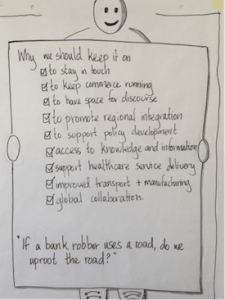Africa has made considerable gains with regards to the Internet in the last decades. It’s Internet penetration grew by more than 400%; its international bandwidth has been multiplied by 20 just in just 5 years between 2009 and 2014; during the same period Africa’s terrestrial backbone has doubled (Internet Society, Internet Development and Internet Governance in Africa, 2015). This achievement required considerable private and public investment and brought hope for Africans, particularly its youth.
Africa and the developing world are already collecting the dividends of its investment. For example, Kenya’s Internet economy is representing 3.6% of its GDP. More interestingly, a staggering 1.3% of the GDP growth in developing countries comes from the Internet economy (World Bank 2016 Digital Dividends, page 55). At the Regional Internet Development Dialogue held in Kigali on May 8 and 9, 2017, representatives of development organizations such as UNESCO, UNECA, and Smart Africa expressed their great hope that the Internet will contribute to help meet all the 17 Sustainable Development Goals.
However, all these hopes might be dashed by the increasing number of Internet shutdowns in Africa and the developing world in general. Just in 2016, there were at least 56 shutdowns of the Internet around the world, most of them in developing countries. These shutdowns affect individuals and organizations that depend on the Internet for their daily lives. At the “Keep it on” workshop in Nairobi at the African Internet Summit, around 30 young participants listed the reasonswhy no one should shut down the Internet and there were many.

Credit: Mwendwa Kivuva on Twitter
The issue of Internet shutdown dominated this year’s African Internet Summit. In particular, one proposal submitted by three members of the AFRINIC community raised considerable discussions. The proposal recommended taking away IP numbers from governments that shutdown the Internet in their countries. For those who are not familiar with AFRINIC’s process, I would like to note that any individual member of AFRINIC can submit a policy proposal. I would also like to note that even if most members of the community are against Internet shutdowns, the proposal has not been supported by the community and in fact there were an unprecedented number of people who raised their voice against it, during the public discussions. And, I am confident that this proposal will never be adopted as an AFRINIC proposal.
In order to dissipate any confusion, at the closing of the African Internet Summit, the African Internet Technical organizations often referred as Af* (AFRINIC, AFTLD, AFNOG, AFREN, Africa CERT, and ISOC Africa) issued a statement distancing themselves from the proposal and in fact expressing their concern that such a proposal will be counterproductive.
So why did the Internet community refute such a proposal that is supposed to fight shutdowns?
- such a proposal would be difficult to implement even if adopted
- this proposal might antagonize governments at a time when we should work more with them
- the proposal might also impact citizens’ ability to access the Internet
The Internet Society believes that the Internet community should work with governments to help them solve some of their legitimate concerns such as the use of the Internet for terrorism, exam cheating, and violence without the need to shut down the Internet. The Internet is the hope of many Africans, and more particularly its youth, and we should all work so that it is available for them all the time to create a better future for them and for Africa.
Read more:
Image credit: Marcin Wichary on Flickr CC BY 2.0

